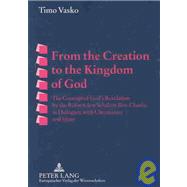
Note: Supplemental materials are not guaranteed with Rental or Used book purchases.
Purchase Benefits
What is included with this book?
| Foreword | 9 | (6) | |||
| 1. Introduction | 15 | (22) | |||
| 2. On the philosophical and theological preconditions for the concept of revelation | 37 | (54) | |||
|
37 | (21) | |||
|
37 | (3) | |||
|
40 | (8) | |||
|
48 | (7) | |||
|
55 | (3) | |||
|
58 | (33) | |||
|
58 | (6) | |||
|
64 | (4) | |||
|
68 | (10) | |||
|
78 | (13) | |||
| 3. God's revelation in the Word | 91 | (46) | |||
|
91 | (3) | |||
|
94 | (43) | |||
|
94 | (14) | |||
|
108 | (6) | |||
|
114 | (10) | |||
|
124 | (13) | |||
| 4. God's dialogue with His people | 137 | (58) | |||
|
137 | (34) | |||
|
137 | (9) | |||
|
146 | (7) | |||
|
153 | (3) | |||
|
156 | (15) | |||
|
171 | (24) | |||
|
171 | (15) | |||
|
186 | (3) | |||
|
189 | (6) | |||
| 5. God's revelation as a prophetic message | 195 | (20) | |||
|
195 | (9) | |||
|
195 | (5) | |||
|
200 | (4) | |||
|
204 | (11) | |||
|
204 | (3) | |||
|
207 | (8) | |||
| 6. Ongoing confrontation with the word of the Bible | 215 | (20) | |||
|
215 | (10) | |||
|
215 | (2) | |||
|
217 | (8) | |||
|
225 | (10) | |||
|
225 | (4) | |||
|
229 | (6) | |||
| 7. Judaism's task of witnessing and the immanent Kingdom of God | 235 | (60) | |||
|
235 | (19) | |||
|
235 | (4) | |||
|
239 | (15) | |||
|
254 | (41) | |||
|
254 | (8) | |||
|
262 | (13) | |||
|
275 | (5) | |||
|
280 | (10) | |||
|
290 | (5) | |||
| Conclusion | 295 | (6) | |||
| Abbreviations | 301 | (8) | |||
| Sources and bibliography | 309 | (22) | |||
| Appendix / Anhang | 331 | (16) | |||
| Index | 347 |
The New copy of this book will include any supplemental materials advertised. Please check the title of the book to determine if it should include any access cards, study guides, lab manuals, CDs, etc.
The Used, Rental and eBook copies of this book are not guaranteed to include any supplemental materials. Typically, only the book itself is included. This is true even if the title states it includes any access cards, study guides, lab manuals, CDs, etc.